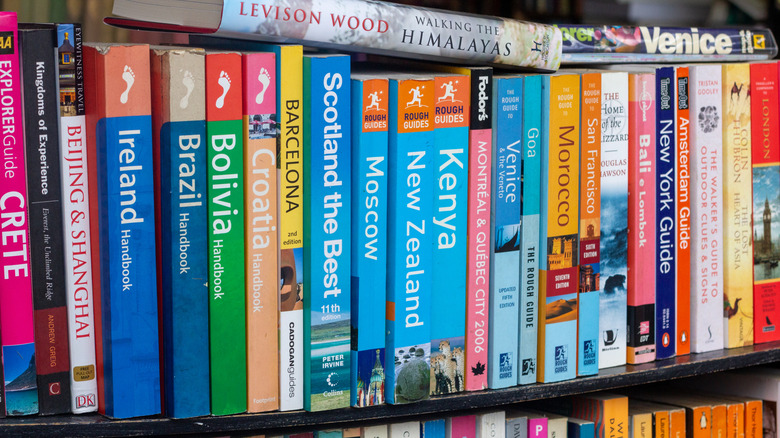Rick Steves Favors This Guidebook Series When He Travels Outside Europe
Rick Steves is arguably America's favorite travel expert, a fountain of knowledge whose films, guidebooks, and websites have helped generations of budding travelers on their way. However, planet Earth is a big place, and no matter how much he globetrots, even Rick Steves can't be expected to know everything. Indeed, though Steves has traveled as far afield as China to catch a glimpse of its "Jetsons World" cities, his personal specialty remains European travel, offering insights into the continent he has come to know intimately since first heading there in the 1970s.
"As a writer — and user — of guidebooks, I am a big believer in their worth," Steves states on his website. "When I visit somewhere as a rank beginner, I equip myself with a good, up-to-date guidebook. With this tool I can travel like an old pro, not because I'm a super traveler, but because I have reliable information and I use it."
And for Steves, when it comes to the best guidebook around, his advice is to reach for the Lonely Planet editions (although ironically, Steves even has tips to avoid feeling lonely when traveling solo). Describing Lonely Planet as "the worldwide standard" for guidebooks, he praises both the geographical reach of their research as well as the "on-the-ground tips" that help readers find mid- and low-budget offerings along with overpriced touristy spots.
Other guide book tips from Rick Steves
But Rick Steves isn't an evangelist when it comes to endorsing Lonely Planet. His website lists several other guidebook brands, all of which he says have their merits and are worth checking out if you have a trip coming up. Steves' recommends two historic travel brands, Frommer's Guides and Fodor's Travel. He suggests the former for their leanness and focus on budget options but cautions that they are better for older travelers (and perhaps a little patronizing). The latter, which focuses exclusively as Steves does on Europe, he explains, is "more encyclopedic than inspiring." It might fall into the same category, then, as DK Eyewitness Travel, which he mentions is good for planning trips but not worth keeping on hand for the journey itself.
Steves' other recommendations include Rough Guides and Bradt Travel Guides (both of which are Eurocentric), the culture and history-focused Blue Guides, and the Michelin Green Guides. He is adamant that as information in guidebooks can quickly become outdated, travelers should always aim to get the latest available edition and even research when the next updated version is being published, in case it is possible to get your hands on it in time for your trip. Though guidebook maps can often be easier to read on an eBook, Steves still recommends going for a paper copy for overall practicality. Have you chosen your guidebook already? Well, there's still plenty to do before you travel: here are the essential things Rick Steves says to always do before traveling.

